Bulk confectionery
Bulk confectionery is a method of commercially dispensing multiple small units of confectionery, either in manufactured bags with a fixed number of units per container, or by the amount of mass placed in a bag. The former is typically used in vending machines, while the latter is more common in retailers that specialize in selling confectionery. Some shops allow the customer to mix multiple types of bulk confectionery in the same bag, then purchase the mixture based on the total weight.
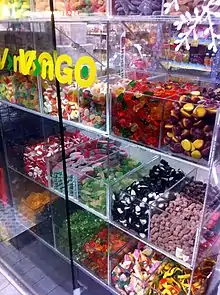
In the United States, some of these confections are called penny candy and are sold by the piece in candy, soda fountain, and five and dime stores. In Britain, this type of candy is also referred to as pick 'n' mix or penny sweets.
In Sweden, bulk confectionery ("Lösgodis") can be found in almost every store, picked by hand. It usually often costs about $7,8 - $10 per kg depending on quantity and where the store is located.
Loose candy is typically sold at kiosks, grocery stores and candy stores in the way that the customer picks up whatever kind, and how much, of candy they want (typically with a scoop) into a bag by themselves. The price of the candy depends on its weight, and the weighing can be either done by the customer or the seller.
History
Bulk confectionery (Swedish Lösgodis) originates back to the 1930s, when Swedish agriculture began to supply the country with refined sugar and therefore made bulk confectionery possible to start selling in smaller shops. In 1984, the Swedish National Food Agency (Livsmedelsverket) approved that it could be sold in ordinary larger stores, given that the candy was separated from each other in small containers and also taken with a ladle, handle, or a smaller bucket.
Since then it has started to spread all around the world, mostly in Europe and Asia. Even some IKEA in North America has started to sell mostly Swedish varieties but also American classics in its stores.
Most common Swedish examples
- Stora Colaflaskor
- Pastellfiskar
- Zoo
- Gelehallon
- Sockrade jordgubbar
- Körsbär
- Karamellguf
- Revolver frukt
- Persikor
- Vattenmeloner
- Fizzy pop
- Fizzy blue
- Skumkantareller
- Ahlgens bilar
- Sockerbitar jordgubb
- Snöbollar jordgubbar
- Snöbollar blå hallon
- Vaniljfudge
- Engelskt konfekt
- Lakritspinnar
- Djungelvrål
- Romerska bågar
- Plopp pralin
- Polly for a Swedish fika
- Jordnötsruta
- Kexchoklad
- Plopp original
- Kick original
- PEZ
- Zoo klubba
- Pimpim klubba
- Fruxo klubba
- Djungelvrål klubba
Examples
- Apple drops
- Bit-O-Honey
- Bottle caps
- Bubble gum (e.g. Bazooka)
- Peppermint sticks
- Candy corn
- Caramels
- Atomic Fireballs
- Fruit sours
- Jawbreakers[2]
- Gummy bears
- Various gummis
- Hot Tamales
- Jelly beans
- Ropes of licorice
- Lollipops (suckers)
- M&M's
- Mary Janes
- Mentos
- Mints
- Pixy Stix
- Red Hots
- Skittles
- Smarties
- Sour balls
- Sugar Daddy
- Tic Tacs
- Tootsie Rolls
- Warheads
- Wax candy
- Penny candy types
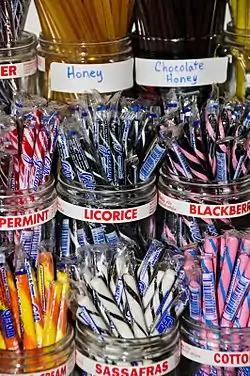 Peppermint and other candy sticks
Peppermint and other candy sticks A sucker
A sucker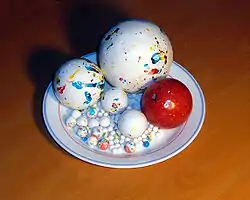 Plate of jawbreakers
Plate of jawbreakers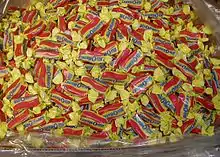 Bit-o-Honey
Bit-o-Honey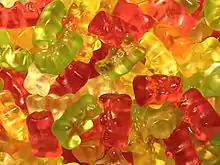 Gummy bears
Gummy bears
See also
- Dagashi, cheap candies and snacks in Japan
References
- https://www.cloetta.se/varumarken-och-produkter/losviktsgodis/
- Brink, Julie. "Marking seasons with sweet memories". (Dec. 01, 2008). Centre Life.
